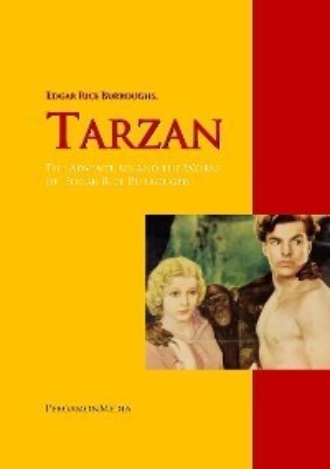
Полная версия
Tarzan: The Adventures and the Works of Edgar Rice Burroughs
"Bless me! Professor," interjected Mr. Philander, who had turned his gaze toward the jungle, "there seems to be someone approaching."
Professor Archimedes Q. Porter turned in the direction indicated by the nearsighted Mr. Philander.
"Tut, tut, Mr. Philander," he chided. "How often must I urge you to seek that absolute concentration of your mental faculties which alone may permit you to bring to bear the highest powers of intellectuality upon the momentous problems which naturally fall to the lot of great minds? And now I find you guilty of a most flagrant breach of courtesy in interrupting my learned discourse to call attention to a mere quadruped of the genus FELIS. As I was saying, Mr.—"
"Heavens, Professor, a lion?" cried Mr. Philander, straining his weak eyes toward the dim figure outlined against the dark tropical underbrush.
"Yes, yes, Mr. Philander, if you insist upon employing slang in your discourse, a 'lion.' But as I was saying—"
"Bless me, Professor," again interrupted Mr. Philander; "permit me to suggest that doubtless the Moors who were conquered in the fifteenth century will continue in that most regrettable condition for the time being at least, even though we postpone discussion of that world calamity until we may attain the enchanting view of yon FELIS CARNIVORA which distance proverbially is credited with lending."
In the meantime the lion had approached with quiet dignity to within ten paces of the two men, where he stood curiously watching them.
The moonlight flooded the beach, and the strange group stood out in bold relief against the yellow sand.
"Most reprehensible, most reprehensible," exclaimed Professor Porter, with a faint trace of irritation in his voice. "Never, Mr. Philander, never before in my life have I known one of these animals to be permitted to roam at large from its cage. I shall most certainly report this outrageous breach of ethics to the directors of the adjacent zoological garden."
"Quite right, Professor," agreed Mr. Philander, "and the sooner it is done the better. Let us start now."
Seizing the professor by the arm, Mr. Philander set off in the direction that would put the greatest distance between themselves and the lion.
They had proceeded but a short distance when a backward glance revealed to the horrified gaze of Mr. Philander that the lion was following them. He tightened his grip upon the protesting professor and increased his speed.
"As I was saying, Mr. Philander," repeated Professor Porter.
Mr. Philander took another hasty glance rearward. The lion also had quickened his gait, and was doggedly maintaining an unvarying distance behind them.
"He is following us!" gasped Mr. Philander, breaking into a run.
"Tut, tut, Mr. Philander," remonstrated the professor, "this unseemly haste is most unbecoming to men of letters. What will our friends think of us, who may chance to be upon the street and witness our frivolous antics? Pray let us proceed with more decorum."
Mr. Philander stole another observation astern.
The lion was bounding along in easy leaps scarce five paces behind.
Mr. Philander dropped the professor's arm, and broke into a mad orgy of speed that would have done credit to any varsity track team.
"As I was saying, Mr. Philander—" screamed Professor Porter, as, metaphorically speaking, he himself "threw her into high." He, too, had caught a fleeting backward glimpse of cruel yellow eyes and half open mouth within startling proximity of his person.
With streaming coat tails and shiny silk hat Professor Archimedes Q. Porter fled through the moonlight close upon the heels of Mr. Samuel T. Philander.
Before them a point of the jungle ran out toward a narrow promontory, and it was for the haven of the trees he saw there that Mr. Samuel T. Philander directed his prodigious leaps and bounds; while from the shadows of this same spot peered two keen eyes in interested appreciation of the race.
It was Tarzan of the Apes who watched, with face a-grin, this odd game of follow-the-leader.
He knew the two men were safe enough from attack in so far as the lion was concerned. The very fact that Numa had foregone such easy prey at all convinced the wise forest craft of Tarzan that Numa's belly already was full.
The lion might stalk them until hungry again; but the chances were that if not angered he would soon tire of the sport, and slink away to his jungle lair.
Really, the one great danger was that one of the men might stumble and fall, and then the yellow devil would be upon him in a moment and the joy of the kill would be too great a temptation to withstand.
So Tarzan swung quickly to a lower limb in line with the approaching fugitives; and as Mr. Samuel T. Philander came panting and blowing beneath him, already too spent to struggle up to the safety of the limb, Tarzan reached down and, grasping him by the collar of his coat, yanked him to the limb by his side.
Another moment brought the professor within the sphere of the friendly grip, and he, too, was drawn upward to safety just as the baffled Numa, with a roar, leaped to recover his vanishing quarry.
For a moment the two men clung panting to the great branch, while Tarzan squatted with his back to the stem of the tree, watching them with mingled curiosity and amusement.
It was the professor who first broke the silence.
"I am deeply pained, Mr. Philander, that you should have evinced such a paucity of manly courage in the presence of one of the lower orders, and by your crass timidity have caused me to exert myself to such an unaccustomed degree in order that I might resume my discourse. As I was saying, Mr. Philander, when you interrupted me, the Moors—"
"Professor Archimedes Q. Porter," broke in Mr. Philander, in icy tones, "the time has arrived when patience becomes a crime and mayhem appears garbed in the mantle of virtue. You have accused me of cowardice. You have insinuated that you ran only to overtake me, not to escape the clutches of the lion. Have a care, Professor Archimedes Q. Porter! I am a desperate man. Goaded by long-suffering patience the worm will turn."
"Tut, tut, Mr. Philander, tut, tut!" cautioned Professor Porter; "you forget yourself."
"I forget nothing as yet, Professor Archimedes Q. Porter; but, believe me, sir, I am tottering on the verge of forgetfulness as to your exalted position in the world of science, and your gray hairs."
The professor sat in silence for a few minutes, and the darkness hid the grim smile that wreathed his wrinkled countenance. Presently he spoke.
"Look here, Skinny Philander," he said, in belligerent tones, "if you are lookin' for a scrap, peel off your coat and come on down on the ground, and I'll punch your head just as I did sixty years ago in the alley back of Porky Evans' barn."
"Ark!" gasped the astonished Mr. Philander. "Lordy, how good that sounds! When you're human, Ark, I love you; but somehow it seems as though you had forgotten how to be human for the last twenty years."
The professor reached out a thin, trembling old hand through the darkness until it found his old friend's shoulder.
"Forgive me, Skinny," he said, softly. "It hasn't been quite twenty years, and God alone knows how hard I have tried to be 'human' for Jane's sake, and yours, too, since He took my other Jane away."
Another old hand stole up from Mr. Philander's side to clasp the one that lay upon his shoulder, and no other message could better have translated the one heart to the other.
They did not speak for some minutes. The lion below them paced nervously back and forth. The third figure in the tree was hidden by the dense shadows near the stem. He, too, was silent—motionless as a graven image.
"You certainly pulled me up into this tree just in time," said the professor at last. "I want to thank you. You saved my life."
"But I didn't pull you up here, Professor," said Mr. Philander. "Bless me! The excitement of the moment quite caused me to forget that I myself was drawn up here by some outside agency—there must be someone or something in this tree with us."
"Eh?" ejaculated Professor Porter. "Are you quite positive, Mr. Philander?"
"Most positive, Professor," replied Mr. Philander, "and," he added, "I think we should thank the party. He may be sitting right next to you now, Professor."
"Eh? What's that? Tut, tut, Mr. Philander, tut, tut!" said Professor Porter, edging cautiously nearer to Mr. Philander.
Just then it occurred to Tarzan of the Apes that Numa had loitered beneath the tree for a sufficient length of time, so he raised his young head toward the heavens, and there rang out upon the terrified ears of the two old men the awful warning challenge of the anthropoid.
The two friends, huddled trembling in their precarious position on the limb, saw the great lion halt in his restless pacing as the blood-curdling cry smote his ears, and then slink quickly into the jungle, to be instantly lost to view.
"Even the lion trembles in fear," whispered Mr. Philander.
"Most remarkable, most remarkable," murmured Professor Porter, clutching frantically at Mr. Philander to regain the balance which the sudden fright had so perilously endangered. Unfortunately for them both, Mr. Philander's center of equilibrium was at that very moment hanging upon the ragged edge of nothing, so that it needed but the gentle impetus supplied by the additional weight of Professor Porter's body to topple the devoted secretary from the limb.
For a moment they swayed uncertainly, and then, with mingled and most unscholarly shrieks, they pitched headlong from the tree, locked in frenzied embrace.
It was quite some moments ere either moved, for both were positive that any such attempt would reveal so many breaks and fractures as to make further progress impossible.
At length Professor Porter made an attempt to move one leg. To his surprise, it responded to his will as in days gone by. He now drew up its mate and stretched it forth again.
"Most remarkable, most remarkable," he murmured.
"Thank God, Professor," whispered Mr. Philander, fervently, "you are not dead, then?"
"Tut, tut, Mr. Philander, tut, tut," cautioned Professor Porter, "I do not know with accuracy as yet."
With infinite solicitude Professor Porter wiggled his right arm—joy! It was intact. Breathlessly he waved his left arm above his prostrate body—it waved!
"Most remarkable, most remarkable," he said.
"To whom are you signaling, Professor?" asked Mr. Philander, in an excited tone.
Professor Porter deigned to make no response to this puerile inquiry. Instead he raised his head gently from the ground, nodding it back and forth a half dozen times.
"Most remarkable," he breathed. "It remains intact."
Mr. Philander had not moved from where he had fallen; he had not dared the attempt. How indeed could one move when one's arms and legs and back were broken?
One eye was buried in the soft loam; the other, rolling sidewise, was fixed in awe upon the strange gyrations of Professor Porter.
"How sad!" exclaimed Mr. Philander, half aloud. "Concussion of the brain, superinducing total mental aberration. How very sad indeed! and for one still so young!"
Professor Porter rolled over upon his stomach; gingerly he bowed his back until he resembled a huge tom cat in proximity to a yelping dog. Then he sat up and felt of various portions of his anatomy.
"They are all here," he exclaimed. "Most remarkable!"
Whereupon he arose, and, bending a scathing glance upon the still prostrate form of Mr. Samuel T. Philander, he said:
"Tut, tut, Mr. Philander; this is no time to indulge in slothful ease. We must be up and doing."
Mr. Philander lifted his other eye out of the mud and gazed in speechless rage at Professor Porter. Then he attempted to rise; nor could there have been any more surprised than he when his efforts were immediately crowned with marked success.
He was still bursting with rage, however, at the cruel injustice of Professor Porter's insinuation, and was on the point of rendering a tart rejoinder when his eyes fell upon a strange figure standing a few paces away, scrutinizing them intently.
Professor Porter had recovered his shiny silk hat, which he had brushed carefully upon the sleeve of his coat and replaced upon his head. When he saw Mr. Philander pointing to something behind him he turned to behold a giant, naked but for a loin cloth and a few metal ornaments, standing motionless before him.
"Good evening, sir!" said the professor, lifting his hat.
For reply the giant motioned them to follow him, and set off up the beach in the direction from which they had recently come.
"I think it the better part of discretion to follow him," said Mr. Philander.
"Tut, tut, Mr. Philander," returned the professor. "A short time since you were advancing a most logical argument in substantiation of your theory that camp lay directly south of us. I was skeptical, but you finally convinced me; so now I am positive that toward the south we must travel to reach our friends. Therefore I shall continue south."
"But, Professor Porter, this man may know better than either of us. He seems to be indigenous to this part of the world. Let us at least follow him for a short distance."
"Tut, tut, Mr. Philander," repeated the professor. "I am a difficult man to convince, but when once convinced my decision is unalterable. I shall continue in the proper direction, if I have to circumambulate the continent of Africa to reach my destination."
Further argument was interrupted by Tarzan, who, seeing that these strange men were not following him, had returned to their side.
Again he beckoned to them; but still they stood in argument.
Presently the ape-man lost patience with their stupid ignorance. He grasped the frightened Mr. Philander by the shoulder, and before that worthy gentleman knew whether he was being killed or merely maimed for life, Tarzan had tied one end of his rope securely about Mr. Philander's neck.
"Tut, tut, Mr. Philander," remonstrated Professor Porter; "it is most unbeseeming in you to submit to such indignities."
But scarcely were the words out of his mouth ere he, too, had been seized and securely bound by the neck with the same rope. Then Tarzan set off toward the north, leading the now thoroughly frightened professor and his secretary.
In deathly silence they proceeded for what seemed hours to the two tired and hopeless old men; but presently as they topped a little rise of ground they were overjoyed to see the cabin lying before them, not a hundred yards distant.
Here Tarzan released them, and, pointing toward the little building, vanished into the jungle beside them.
"Most remarkable, most remarkable!" gasped the professor. "But you see, Mr. Philander, that I was quite right, as usual; and but for your stubborn willfulness we should have escaped a series of most humiliating, not to say dangerous accidents. Pray allow yourself to be guided by a more mature and practical mind hereafter when in need of wise counsel."
Mr. Samuel T. Philander was too much relieved at the happy outcome to their adventure to take umbrage at the professor's cruel fling. Instead he grasped his friend's arm and hastened him forward in the direction of the cabin.
It was a much-relieved party of castaways that found itself once more united. Dawn discovered them still recounting their various adventures and speculating upon the identity of the strange guardian and protector they had found on this savage shore.
Esmeralda was positive that it was none other than an angel of the Lord, sent down especially to watch over them.
"Had you seen him devour the raw meat of the lion, Esmeralda," laughed Clayton, "you would have thought him a very material angel."
"There was nothing heavenly about his voice," said Jane Porter, with a little shudder at recollection of the awful roar which had followed the killing of the lioness.
"Nor did it precisely comport with my preconceived ideas of the dignity of divine messengers," remarked Professor Porter, "when the—ah—gentleman tied two highly respectable and erudite scholars neck to neck and dragged them through the jungle as though they had been cows."
Chapter XVII
Burials
As it was now quite light, the party, none of whom had eaten or slept since the previous morning, began to bestir themselves to prepare food.
The mutineers of the Arrow had landed a small supply of dried meats, canned soups and vegetables, crackers, flour, tea, and coffee for the five they had marooned, and these were hurriedly drawn upon to satisfy the craving of long-famished appetites.
The next task was to make the cabin habitable, and to this end it was decided to at once remove the gruesome relics of the tragedy which had taken place there on some bygone day.
Professor Porter and Mr. Philander were deeply interested in examining the skeletons. The two larger, they stated, had belonged to a male and female of one of the higher white races.
The smallest skeleton was given but passing attention, as its location, in the crib, left no doubt as to its having been the infant offspring of this unhappy couple.
As they were preparing the skeleton of the man for burial, Clayton discovered a massive ring which had evidently encircled the man's finger at the time of his death, for one of the slender bones of the hand still lay within the golden bauble.
Picking it up to examine it, Clayton gave a cry of astonishment, for the ring bore the crest of the house of Greystoke.
At the same time, Jane discovered the books in the cupboard, and on opening the fly-leaf of one of them saw the name, JOHN CLAYTON, LONDON. In a second book which she hurriedly examined was the single name, GREYSTOKE.
"Why, Mr. Clayton," she cried, "what does this mean? Here are the names of some of your own people in these books."
"And here," he replied gravely, "is the great ring of the house of Greystoke which has been lost since my uncle, John Clayton, the former Lord Greystoke, disappeared, presumably lost at sea."
"But how do you account for these things being here, in this savage African jungle?" exclaimed the girl.
"There is but one way to account for it, Miss Porter," said Clayton. "The late Lord Greystoke was not drowned. He died here in this cabin and this poor thing upon the floor is all that is mortal of him."
"Then this must have been Lady Greystoke," said Jane reverently, indicating the poor mass of bones upon the bed.
"The beautiful Lady Alice," replied Clayton, "of whose many virtues and remarkable personal charms I often have heard my mother and father speak. Poor woman," he murmured sadly.
With deep reverence and solemnity the bodies of the late Lord and Lady Greystoke were buried beside their little African cabin, and between them was placed the tiny skeleton of the baby of Kala, the ape.
As Mr. Philander was placing the frail bones of the infant in a bit of sail cloth, he examined the skull minutely. Then he called Professor Porter to his side, and the two argued in low tones for several minutes.
"Most remarkable, most remarkable," said Professor Porter.
"Bless me," said Mr. Philander, "we must acquaint Mr. Clayton with our discovery at once."
"Tut, tut, Mr. Philander, tut, tut!" remonstrated Professor Archimedes Q. Porter. "'Let the dead past bury its dead.'"
And so the white-haired old man repeated the burial service over this strange grave, while his four companions stood with bowed and uncovered heads about him.
From the trees Tarzan of the Apes watched the solemn ceremony; but most of all he watched the sweet face and graceful figure of Jane Porter.
In his savage, untutored breast new emotions were stirring. He could not fathom them. He wondered why he felt so great an interest in these people—why he had gone to such pains to save the three men. But he did not wonder why he had torn Sabor from the tender flesh of the strange girl.
Surely the men were stupid and ridiculous and cowardly. Even Manu, the monkey, was more intelligent than they. If these were creatures of his own kind he was doubtful if his past pride in blood was warranted.
But the girl, ah—that was a different matter. He did not reason here. He knew that she was created to be protected, and that he was created to protect her.
He wondered why they had dug a great hole in the ground merely to bury dry bones. Surely there was no sense in that; no one wanted to steal dry bones.
Had there been meat upon them he could have understood, for thus alone might one keep his meat from Dango, the hyena, and the other robbers of the jungle.
When the grave had been filled with earth the little party turned back toward the cabin, and Esmeralda, still weeping copiously for the two she had never heard of before today, and who had been dead twenty years, chanced to glance toward the harbor. Instantly her tears ceased.
"Look at them low down white trash out there!" she shrilled, pointing toward the Arrow. "They-all's a desecrating us, right here on this here perverted island."
And, sure enough, the Arrow was being worked toward the open sea, slowly, through the harbor's entrance.
"They promised to leave us firearms and ammunition," said Clayton. "The merciless beasts!"
"It is the work of that fellow they call Snipes, I am sure," said Jane. "King was a scoundrel, but he had a little sense of humanity. If they had not killed him I know that he would have seen that we were properly provided for before they left us to our fate."
"I regret that they did not visit us before sailing," said Professor Porter. "I had proposed requesting them to leave the treasure with us, as I shall be a ruined man if that is lost."
Jane looked at her father sadly.
"Never mind, dear," she said. "It wouldn't have done any good, because it is solely for the treasure that they killed their officers and landed us upon this awful shore."
"Tut, tut, child, tut, tut!" replied Professor Porter. "You are a good child, but inexperienced in practical matters," and Professor Porter turned and walked slowly away toward the jungle, his hands clasped beneath his long coat tails and his eyes bent upon the ground.
His daughter watched him with a pathetic smile upon her lips, and then turning to Mr. Philander, she whispered:
"Please don't let him wander off again as he did yesterday. We depend upon you, you know, to keep a close watch upon him."
"He becomes more difficult to handle each day," replied Mr. Philander, with a sigh and a shake of his head. "I presume he is now off to report to the directors of the Zoo that one of their lions was at large last night. Oh, Miss Jane, you don't know what I have to contend with."
"Yes, I do, Mr. Philander; but while we all love him, you alone are best fitted to manage him; for, regardless of what he may say to you, he respects your great learning, and, therefore, has immense confidence in your judgment. The poor dear cannot differentiate between erudition and wisdom."
Mr. Philander, with a mildly puzzled expression on his face, turned to pursue Professor Porter, and in his mind he was revolving the question of whether he should feel complimented or aggrieved at Miss Porter's rather backhanded compliment.
Tarzan had seen the consternation depicted upon the faces of the little group as they witnessed the departure of the Arrow; so, as the ship was a wonderful novelty to him in addition, he determined to hasten out to the point of land at the north of the harbor's mouth and obtain a nearer view of the boat, as well as to learn, if possible, the direction of its flight.
Swinging through the trees with great speed, he reached the point only a moment after the ship had passed out of the harbor, so that he obtained an excellent view of the wonders of this strange, floating house.
There were some twenty men running hither and thither about the deck, pulling and hauling on ropes.
A light land breeze was blowing, and the ship had been worked through the harbor's mouth under scant sail, but now that they had cleared the point every available shred of canvas was being spread that she might stand out to sea as handily as possible.
Tarzan watched the graceful movements of the ship in rapt admiration, and longed to be aboard her. Presently his keen eyes caught the faintest suspicion of smoke on the far northern horizon, and he wondered over the cause of such a thing out on the great water.






